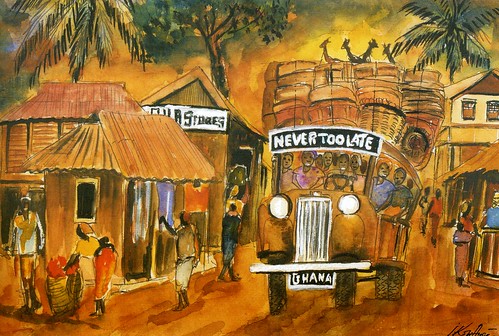Blues of an Omnivorous Reader
Wherein I reproduce a couple of apparently futile musings on the announced death of Google Reader. I've always preferred that my public utterances be available in a feed and Google Plus by design doesn't provide one. Further I received a transatlantic call yesterday from The Parents who are alarmed and incredulous that such an important and incredibly useful tool - an essential part of their experience of the web, would be summarily executed, as it were. They raised a point that I hadn't considered as I've been thinking about Plan B. It is easy to say that there are other feed readers, but almost all the proposed alternatives will not be free if they operate at Google's scale, and this presents complications if you live in a country like Ghana which is a black sheep in terms of e-commerce. Although my parents are undoubtedly willing and able to pay for such a service, they will be locked out because PayPal, Google Wallet and most credit card payment systems are not available to Ghanaians. I'm going to have do the dance of getting their credentials, signing them up for Feedly, Newsblur or what have you and entering in my payment details. Now that's a workable arrangement for my family, but what about others in similar circumstances? I had posited, with some amount of hyperbole, that this was a massive destruction of consumer surplus but I didn't know the half of it.
1487 Feeds (or Blues of an Omnivorous Reader)
A belated, and certainly, redundant comment to this thread.
I suppose I am an outlier in terms of usage as Google Reader is my single most used web application (more than even search and email), but I'll have to repeat the question I've been asking myself for a couple of days now: how does one handle 1487 different content sources efficiently across the up to 10 devices that I might use daily?The corollary question also comes to mind: how did I come to aggregate that many sources of data?
The answer to both those questions is Google Reader.
Chris Wetherell's thesis was that "feed reading is inherently polymorphic" and he would know as he designed Google Reader.
As I'm having to now export said 1487 feeds to try out various alternatives, I've been thinking through my usage of Reader and I must agree with him on that front, because what I see is a wide variety of sources organized however I want.
Some are blogs, some are news sites, some are topical, some sui generis, some polymath, some from people I disagree with, some are the web output of friends, some from family, some are photo blogs, some are podcasts, comics, or comments. Some are on current affairs, some on Africa (although that tag seems to encompass anything non-US), some on technology, some tagged as general interest, some pure entertainment.
Some are high traffic, some are infrequently updated. An example: a friend recently emerged after a 2 year disappearance in the new parent cone of silence. On his return to blogging, he seems to be no longer interested in writing about technology. No problem: simply tag him or add him to a different folder (feeds can be multiply categorized).
Some are work related. Some are very narrowly focused. Some are alerts that I want to monitor e.g. feeds in Flickr and Delicious (tags or people or groups), Google alerts. For a while I could easily monitor almost everything of interest about Ghana since writing on Ghana and indeed the Ghanaian web footprint has been so small.
Some are forums. Some are for research often more speculative than not (e.g. the two months when I mused about a dissertation on two-sided markets in technology). Some are for archiving purposes (e.g. various synthetic feeds of sorts), and of course there are the vanity feeds (e.g. the defunct Technorati watch lists or Blogdigger searhes, Friendfeed etc.) which are all filed in the Egotism folder).
Anything that could generate a feed is fair game and has an equal opportunity.
Some are full feeds (which I prefer), some only offer headlines and some have article summaries but I've found that using Reader to scan headlines and/or summaries is still more useful as a starting point to distill and decide what to open in a new tab.
The huge variety boggles and has matched my varying interests over time.
Humanity Critic can lie next to Maciej Ceg?owski who lies next to Malcolm Gladwell. Google Reader democratizes the process of information consumption.
All of these sources could be sliced and diced, categorized any which way and sorted however I want.
Each folder can be read differently since Reader accommodates different reading styles. Skimming is easy if need be. You could have a river of news with whatever filtering that you want. You could decide to focus on a particular source or topic and deeply explore.
Sort also is important, some things should be read in order e.g. Doonesbury, for others recency is more important.
Sort by "magic" used to be almost uncanny in surfacing what I found most interesting. The algorithm was changed a couple of years ago and it has suffered greatly (some of the higher traffic sites are overwhelming things) and the All Items view hasn't been as useful ever since in bubbling up interesting content. In mitigation, I've since segregated the high traffic but low signal feeds into different folders where they can be easily triaged and marked read to regain sanity. The loss of the old sharing features (and enforced move to Google+) was hard to take, and perhaps contributed to the decline in effectiveness of sort by magic. One click starring and sharing was the most wonderful thing while it lasted.
Starring and synchronization of unread state across multiple devices are of course the killer features.
The high information density is unmatched on the desktop and mobile. (Indeed the mobile web app is better than the Android app for what it's worth). Keyboard shortcuts for navigation and the visual design are the icing on the cake.
Others have explicated much of these design traits and at length.
A few other things:
- An invaluable debugging tool for feed development.
It's hard to remember how long it took to develop robust tools to produce and consume feeds, not to mention how contentious the process was. Google Reader was a major driver and was at the heart of this process. Mark Pilgrim's myth of RSS compatibility is one iconic example in this vein. It was hard work. Now in 2013, every software product can produce a valid Atom or RSS feed, so much so that we can almost retire the heroic feed validator service. Atom stores proliferate everywhere even if only under the covers. Feeds are essential web infrastructure and like all good infrastructure they are only noticed in their absence. - Archiving
Google Reader's archives are second to none: so long as at least one person subscribed to a feed, its content was archived. This obviously includes archives of now-defunct blogs. For example, the only archive of Teju Cole's Modal Minority blog that eventually morphed into his novel Open City is to be found in Google Reader, the Internet Archive doesn't have a copy. Imagine a future, or even current, student with a mind to write a dissertation on the most critically praised blog-turned-novel that we have seen. Well that student has 3 months to get cracking or there will be no discoursing on "The artist as urban exiled soul: witnessing the Bush years through episodic flânerie". Links are ephemeral you see.
The archiving features have saved many a misconfigured blog's data. - A Public Service
In the same way that people in Iran and other countries were using sharing in Google Reader to do interesting things to route around censorship and political repression (something that came to light when Google+ forcibly became the "one true way" to share from Reader), the impending loss will be felt in other countries. It's hard to arbitrarily filter Google, it's too useful a bundle of services. Filtering Feedly? or Newsblur? Come on, let's be serious.
Google Reader is the single most useful tool I've found "for organizing the world's information".Not to be facetious, but asking one to articulate its value and what in its design can lead to the above sentiment is really sad. It's hard to believe that it's not obvious. It's hard to believe that it has to be articulated. Really. It's hard to believe.
Fairy Tale Endings
Responding to Ben Hyde's first take on the matter: Fairy tale is the right metaphor and Google Reader's is a cautionary tale akin to the Tower of Babel. Coordination costs is the issue and what we are seeing is a vast consumer surplus being dissipated.
And it hurts even if you saw the blow coming. I made my peace with the loss of sharing features a couple of years ago and the enforced push to Google+, I made my peace with many other losses, but now I'm been in mourning for the web.Grievous bodily harm is being done to the web ecosystem. For a good decade, tools and infrastructure were built that wrangled the web with a view of feeds as an ideal medium for information dissemination and consumption. Google Reader's role was crucial and necessary.
Unlike Les Orchard, I didn't go so far as to actually write books or move home to work on the teams that built some of these building blocks (Delicious, Flickr, Reader) but I similarly evangelized and worked on them. It's a shame.
In retrospect, Mark Fletcher (of Bloglines fame) cashed out at the right time, from what I can tell his life post-Bloglines is a lot of safaris. All power to him.
Looking forward more broadly, I can see the outlines of how the story of Amazon will ultimately play out. For a moment that will seem all too brief in retrospect, consumers had use of a vast consumer surplus as the web was built and options value flowed in their direction. Then we heard about "Spring Cleaning"...
I feel sad writing this note in Google+.
Soundtrack for this note
- Donny Hathaway - A Dream
"It was a dream" - Whitney Houston - Why does it hurt so bad
- The Spinners - It's a shame


